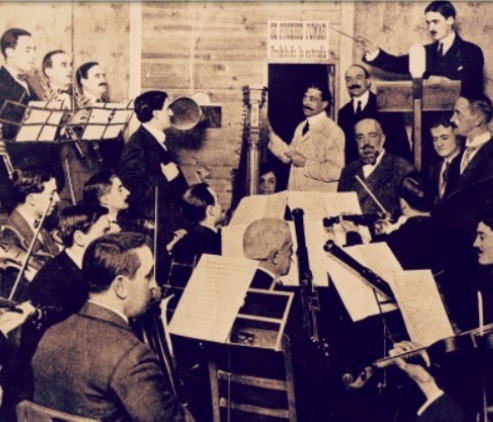Eresbil
ORIGEN
Eresbil surge en el año 1974 como fruto de las necesidades de repertorio para programar MUSIKASTE, festival dedicado a la difusión de obras de compositores vascos que se celebra anualmente en Errenteria. La iniciativa de crear un centro que recogiera las obras de estos compositores para su difusión a través de dicho festival nace de la mano de José Luis Ansorena, director de la Coral Andra Mari y primer director de Eresbil.
La institucionalización de Eresbil comienza en 1977 con la creación del Patronato Provincial del Archivo, en el que están representados el municipio de Errenteria y la provincia de Gipuzkoa, además de la Coral Andra Mari, entidad creadora, y la Fraternidad de Hnos. Capuchinos, quienes proporcionan un lugar donde instalar el archivo en uno de los bajos de la Parroquia de Nuestra Señora de Fátima.
El año 1986 se crea, por decreto ley del Gobierno Vasco, el Patronato de ERESBIL – Archivo de Compositores Vascos, en el que el propio gobierno participa. En el año 2000, Jon Bagüés sustituye en la dirección a José Luis Ansorena y, durante su mandato, en el año 2002, el archivo se traslada a la actual sede, momento en el que la Fraternidad de Hnos. Capuchinos abandona su patronato.
El año 2011 se establece su actual configuración jurídica como Fundación con el nombre de ERESBIL – Archivo Vasco de la Música / ERESBIL – Musikaren Euskal Artxiboa. El patronato de la fundación queda integrado por: el Gobierno Vasco, quien ostenta su presidencia, la Diputación de Gipuzkoa, el Ayuntamiento de Errenteria y la Coral Andra Mari, de Errenteria. En el año 2020, tras la jubilación de Jon Bagüés, Pello Leiñena ocupa el cargo de director.

OBJETIVO
ERESBIL tiene por objeto la investigación, recopilación, conservación y difusión del Patrimonio Musical y, en especial, la producción de los Compositores Vascos. Por esta labor, Eresbil ha sido reconocida con diversos premios y galardones:
- Medalla de Plata al Mérito en las Bellas Artes (Ministerio de Cultura, 1990)
- Premio Sabino Arana, en la modalidad de Sociedad (1998)
- Premio Maestro Escudero de las Artes (2003)
- Elkar Saria (2017)
- Premio Musika Bulegoa (2020)
SECCIONES
Dentro de su ámbito de actuación, Eresbil trabaja con los tres principales sistemas de organización de los documentos: el archivístico para la descripción de sus fondos y colecciones externas, el bibliotecario para la colección propia y el documental para gestión de diversos recursos.
Esta estructura ha propiciado la creación de varias áreas y secciones:
- Sección de Fondos y Colecciones
- Área de Partituras
- Área de documentos sonoros y audiovisuales
- Área de Biblioteca Sección de documentación
Desde el año 2009 Eresbil amplía su campo de actividades para acoger documentación del área de danza, tanto tradicional como clásica o contemporánea.
RELACIONES INSTITUCIONALES
Eresbil colabora asiduamente con diversas instituciones, tanto musicales como documentales, entre las que se encuentran: la Asociación de Compositores Vasco-Navarros, la Asociación de Txistularis, la Federación de Coros de Euskal Herria, Eusko Ikaskuntza, Musikene, Mintzola, Ereintza, Dantzagune, el Archivo de la Música y de las Artes Escénicas de Navarra (AMAEN), Euskal Kultur Erakundea – Institut Culturel Basque y el Centro de Documentación de las Artes Escénicas y de la Música del INAEM.
Asimismo, Eresbil es miembro de las siguientes asociaciones: Eusko Ikaskuntza, Sociedad Española de Musicología, Asociación Española de Documentación Musical, Association for Recorded Sound Collections (USA), International Association of Sound Archives e International Association of Music Libraries.



